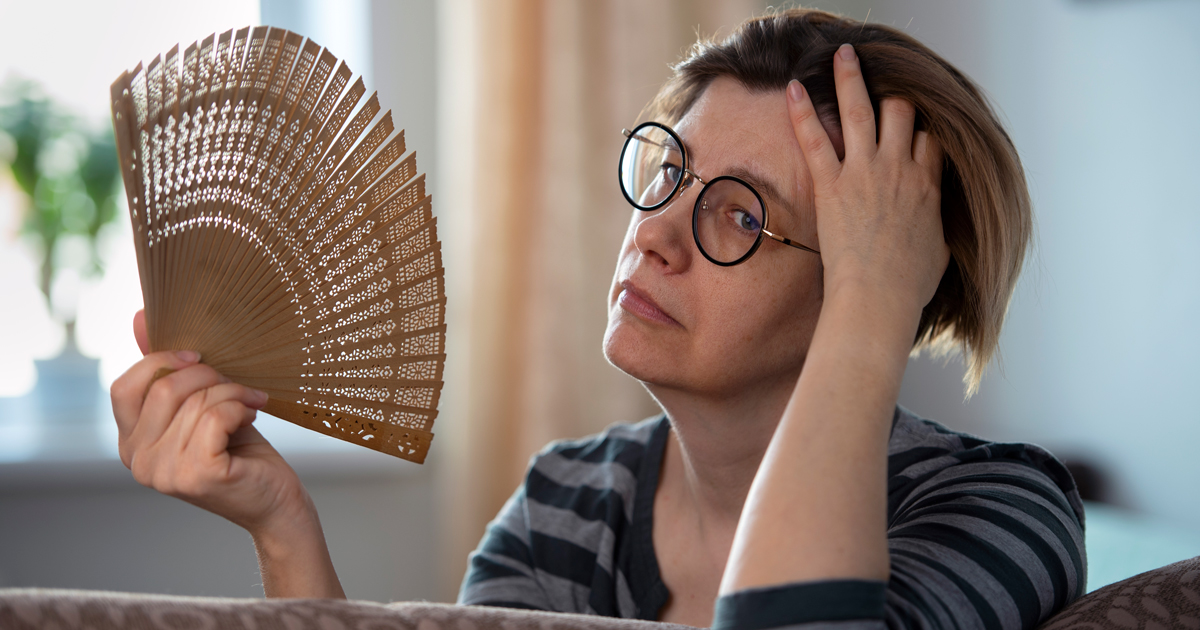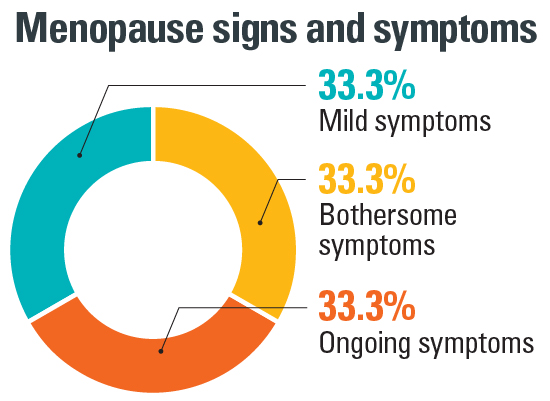Understanding menopause: 4 common symptoms and how to treat them

Many people associate menopause with the onset of symptoms like hot flashes and night sweats. However, these symptoms are actually strongest in the years before menopause officially begins. This time of transition, also known as perimenopause, usually begins sometime in your 30s or 40s and can last for several years.
Even if you're having hot flashes and irregular periods, you aren't officially in menopause until you've had no periods for at least 12 months. In the U.S., the average age that a woman enters menopause is 51.
"In order to be in menopause you must be at least 40 years old," explains OB-GYN Katie Lessman, MD. "If you stop having periods before then, your doctor will want to look for another cause."
Will menopause test kits tell me if I'm in menopause?
Menopause is a clinical diagnosis that your doctor will make based on several factors. A menopause test kit will only measure the level of follicle-stimulating hormone in your blood or saliva. Women in their mid-40s and older will have elevated FSH levels. However, this number won't tell you when your periods will stop or how long other symptoms will last.
What symptoms might I experience as I enter menopause?
As you transition into menopause, your ovaries stop ovulating and your estrogen levels will fluctuate. These fluctuations in hormone levels are responsible for the symptoms that many women experience at this time.
The signs and symptoms of menopause can vary greatly from person to person. "As a general rule, one-third of women will transition into menopause with only mild symptoms or none at all," says Dr. Lessman. "Another third will experience bothersome symptoms for a few years. The final third will have symptoms that improve but never go away."

4 common symptoms of menopause include:
- Hot flashes and night sweats: Hot flashes and night sweats, collectively known as vasomotor symptoms, tend to be one of the first signs that a woman is approaching menopause. When the ovaries start working less predictably, estrogen levels will rise and drop. The dips in estrogen make the temperature sensor in the brain extra sensitive, causing hot flashes and night sweats
- Sleep disruptions: Many women notice changes in their quality of sleep. Night sweats may wake you up and make it difficult to sleep. Even if you don't experience night sweats, your sleep quality may not be the same as it was before
- Mood changes: Dropping hormone levels make people more vulnerable to anxiety and depression, just like they do after childbirth
- Vaginal dryness: Once your estrogen levels have been low for a while, vaginal dryness and pain during sex become more common
The good news is that once you officially enter menopause many of these symptoms will improve or stop altogether. So, if you've been experiencing anxiety and depression, your mood should return to normal. Hot flashes and night sweats will also likely improve, if not stop completely, once you enter menopause.
Treating menopause symptoms
Hot flashes and night sweats
"Hormone replacement therapy is the most effective treatment for hot flashes and night sweats. We can expect a 70% to 90% improvement in vasomotor symptoms with estrogen," says Dr. Lessman.
Do I need to stop HRT after five years? What if I'm still having hot flashes?
Most of the time hot flashes and night sweats will either improve dramatically or go away completely within five years of menopause. If symptoms don't improve after five years, you will need to work with your doctor to evaluate the risks and benefits of continuing hormone replacement therapy as you age.
"Some risks, like that of colon cancer or osteoporosis, continue to decrease with estrogen use," explains Dr. Lessman. "Other risks, like breast cancer, will increase over time. Some risks, such as heart disease, can get better or worse with estrogen, depending on how and when it's used."
Because of these risks, hormone replacement therapy is not recommended for treating other menopause symptoms like mood disturbances. "When it comes to treating depression and anxiety, HRT is far more dangerous than taking antidepressants," warns Dr. Lessman. "Counseling and medications are better treatment options for these types of symptoms."
Is HRT the only treatment for hot flashes?
There are a few other treatments besides HRT that have been shown to improve vasomotor symptoms by 50% to 70%. These include:
- Clonidine: a type of blood pressure medicine
- Gabapentin: a drug that impacts nerve signaling and is used for chronic pain and seizure prevention
- Paroxetine: an antidepressant
Herbal remedies, vitamins, exercise, acupuncture and reflexology may help you to cope with hot flashes and night sweats. Unfortunately, says Dr. Lessman, the body of evidence shows that they won't make those symptoms less frequent or intense.
How do I treat vaginal dryness?
"Vaginal estrogen is the most effective treatment for vaginal dryness and painful intercourse," says Dr. Lessman. "These can be prescribed as creams, tablets or vaginal rings. There are a few other products on the market that treat the same symptoms. But frankly, they're inferior to estrogen."
When it comes to lubricants, Dr. Lessman recommends using natural oils, such as coconut or olive oil instead of synthetic lubricants. "Even Crisco is so chemically simple that it can soothe irritated vulvar and vaginal skin," she added. "For some women, a dime-sized dollop placed in the vagina twice a day can replace the need for vaginal estrogen."
Who should I see for treatment of menopause symptoms?
Talk to your primary care physician or OB-GYN. Depending on your symptoms, your doctor may be able to provide treatment or refer you to the appropriate specialist. You can also call 800.922.0000 to schedule an appointment.




